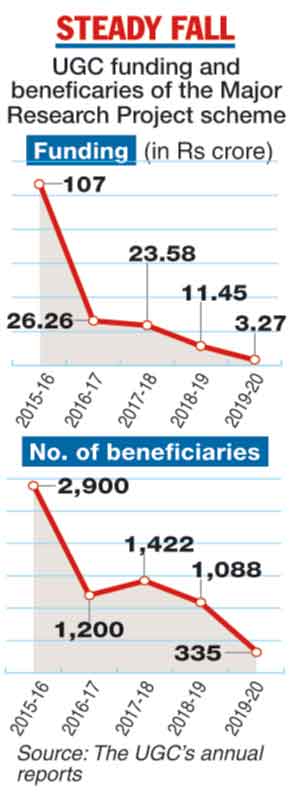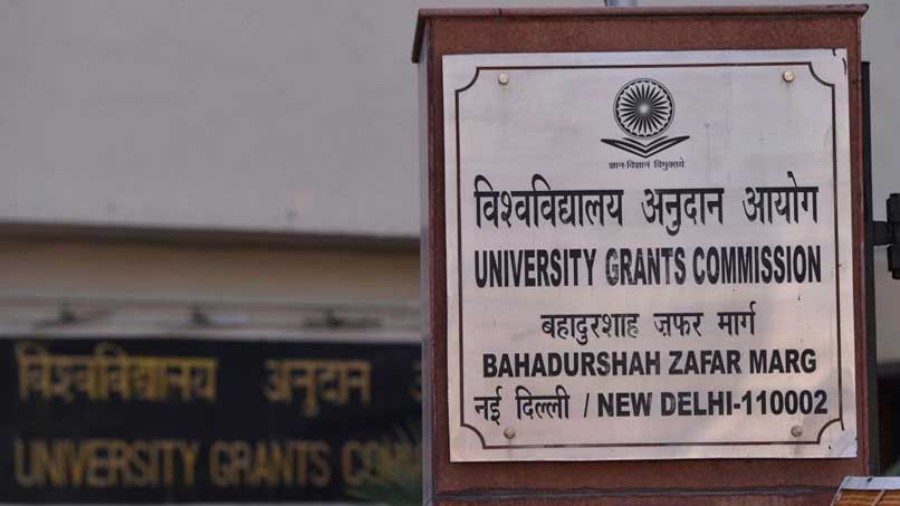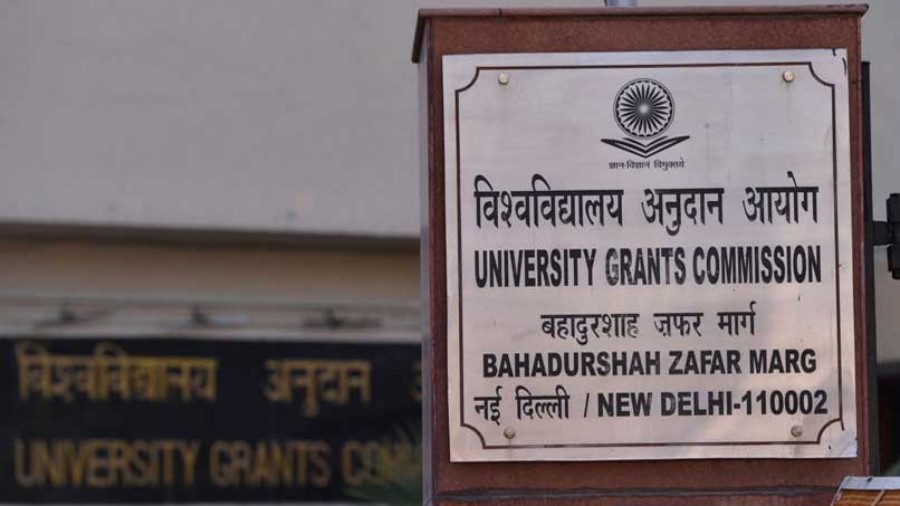The University Grants Commission has stopped several research projects while some are lying dormant allegedly because of lack of funds from the Centre.
The Major Research Project (MRP) of higher education regulator UGC is a case in point. (See chart)

According to the annual reports of the UGC, funding for the scheme has been declining over the past five years as it has been declared “closed”.
The number of existing beneficiaries has been decreasing as researchers finish their projects.
A retired academic blamed poor research proposals for the decline in funding.
The UGC secretary is yet to respond to a query from this newspaper on the closure of the projects.
The UGC website suggests that around half a dozen other research promotion schemes have been shelved.
The website shows as “closed” since 2017-18 several programmes.
The listed “closed” programmes include Emeritus Fellowship, Dr S. Radhakrishnan Post Doctoral Fellowship in Humanities and Social Sciences, Post Doctoral Fellowship to Women Candidates and Post Doctoral Fellowship to SC-ST Candidates. The National Fellowship for Scheduled Caste students is also shown to have been discontinued in 2018-19.
The UGC provides financial assistance for the research proposals received from permanent, regular, working or retired teachers at recognised universities and colleges under the MRP, which enables them to carry out in-depth studies in specific subject areas along with their regular jobs or after superannuation.
Under the MRP, each beneficiary receives Rs 20 lakh for a science project and Rs 15 lakh for research in humanities and social science. The research proposals are evaluated by experts before approval.
The Emeritus Fellowship scheme provides opportunities to retired teachers up to the age of 70 to pursue active research in their respective fields of specialisation. The honorarium for a Fellow is Rs 31,000 a month for two years, plus an annual contingency amount of Rs 50,000.
Hundred slots each used to open in science and humanities streams every alternative year. During 2019-20, an expenditure of Rs 1.45 crore had been incurred to pay 91 beneficiaries. The number of beneficiaries had been 169 the previous year when the UGC had spent Rs 3.82 crore. There were 559 beneficiaries during 2017-18 when the UGC had shelled out Rs 10.03 crore for the scheme.
“Funds are still being released for some of the schemes that are closed because the researchers get paid in phases,” an UGC official said.
In 2019, the UGC launched a Scheme for Trans-Disciplinary Research for India’s Developing Economy (STRIDE) to promote innovative solutions for regional, national and global problems. In 2019, the scheme selected 35 institutions for research capacity building. However, no further progress has been made since.
“A scheme like STRIDE has great potential to serve the needs of the country. It seeks to connect industry with universities and also promotes research in social science and humanities. It has been lying idle for two years. It is disappointing,” a former UGC functionary said on condition of anonymity.
Delhi University Teachers Association president A.K. Bhagi, who belongs to the BJP-backed National Democratic Teachers Front, demanded more funding for research.
“Institutes of higher education should become excellent research centres. Research and infrastructure funding should increase for universities and colleges,” Bhagi said.
Former UGC secretary R.K. Chauhan said the government had reduced funding for the UGC, which was why research was getting least priority.
“The UGC has no funds for research. Actually, this government is not interested in real research, particularly in social science and humanities. It fears that the findings will not suit its narratives,” Chauhan said.
Such research typically looks into the jobs scenario, the economy and caste matters, along with other issues.
Chauhan said the decline in funding was affecting the research environment in universities.
The Telegraph sent an email to UGC secretary Rajnish Jain on December 27 asking about the decrease in funding for research but is yet to receive a response.
Prof C. Mohan Kumar, a retired faculty member of Kerala University, said one of the reasons for diminished funding was poor research proposals.
“Most of the research proposals coming for funding do not meet the expected levels of quality. People want to do research for the sake of research. In areas of advanced research, Indian institutions are largely lagging behind those in advanced countries,” Kumar said.
“The problem is with the mentors. We need dedicated mentors who can drive research work,” he added.












